形容词比较等级
形容词比较级
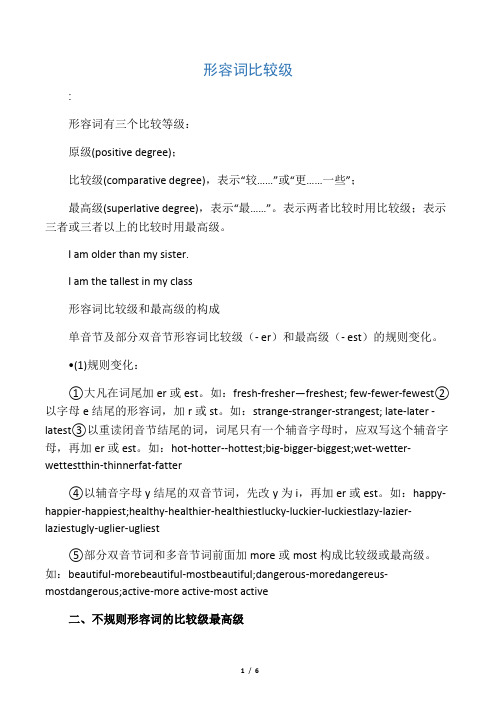
形容词比较级:形容词有三个比较等级:原级(positive degree);比较级(comparative degree),表示“较……”或“更……一些”;最高级(superlative degree),表示“最……”。
表示两者比较时用比较级;表示三者或三者以上的比较时用最高级。
I am older than my sister.I am the tallest in my class形容词比较级和最高级的构成单音节及部分双音节形容词比较级(- er)和最高级(- est)的规则变化。
•(1)规则变化:①大凡在词尾加er或est。
如:fresh-fresher—freshest; few-fewer-fewest②以字母e结尾的形容词,加r或st。
如:strange-stranger-strangest; late-later -latest③以重读闭音节结尾的词,词尾只有一个辅音字母时,应双写这个辅音字母,再加er或est。
如:hot-hotter--hottest;big-bigger-biggest;wet-wetter-wettestthin-thinnerfat-fatter④以辅音字母y结尾的双音节词,先改y为i,再加er或est。
如:happy-happier-happiest;healthy-healthier-healthiestlucky-luckier-luckiestlazy-lazier-laziestugly-uglier-ugliest⑤部分双音节词和多音节词前面加more或most构成比较级或最高级。
如:beautiful-morebeautiful-mostbeautiful;dangerous-moredangereus-mostdangerous;active-more active-most active二、不规则形容词的比较级最高级原级good / wellmany / muchlittleill / bad / badlyfarold比较级bettermorelessworsefarther / furtherolder / elder最高级bestmostleastworstfarthest / furthestoldest / eldest注:older大凡指年龄大小;My father is older than my mother. elder指长幼关系(大凡修饰名词作定语);My elder brother is a driver.farther指距离更远;further指抽像的.I want to study English further.further reading一、原级的用法1.只能修饰原级的词,very,quite,so,too•He is too tired to walk on.他太累了以至于不能再继续走了。
形容词比较等级

形容词副词比较等级形容词有三个等级:原级、比较级、最高级。
现将其用法解释如下:一、原级用法形容词的原级表示人或事物的特征、性质。
句中只出现一个人或事物,没有比较对象时,要用原级。
使用原级时,要抓住几个关键的词或短语:very, so, quite, rather, too, much too等等,这些词或短语之后常用原级。
例如:I am tall. 我个子高。
My bag is very new.The box is too heavy.[友情提示]1.表示程度相同时,我们常用"as +形容词/副词的原级+ as"句型,意思是"和......一样"。
例如: She is as pretty as her sister. 她和她姐姐一样漂亮。
2.表示程度不同时,我们常用"not as/so +形容词的原级+ as"句型,意思是"不如"。
例如: It's not so/as cold today as yesterday. 今天不如昨天冷。
二、比较级用法形容词的比较级用于二者(人或事物)的比较。
基本句型为:主语+ 系动词+ 形容词比较级+ than + 对比人或事物。
例如:This cake is bigger than that one.这块蛋糕比那块大。
[友情提示]1.在比较级前可用much, a lot, a little, even, still等词修饰。
例如:I am much older than my sister.我比我妹妹大得多。
This bag is much heavier than that one.2.被比较的对象必须是同一类的。
例如:在冬天,北京的天气比广州冷得多。
误:In winter, the weather in Beijing is much colder than Guangzhou.正:In winter, the weather in Beijing is much colder than that in Guangzhou.3. "The+形容词比较级..., the+形容词比较级..."表示" 越... 就越..."。
形容词的比较等级
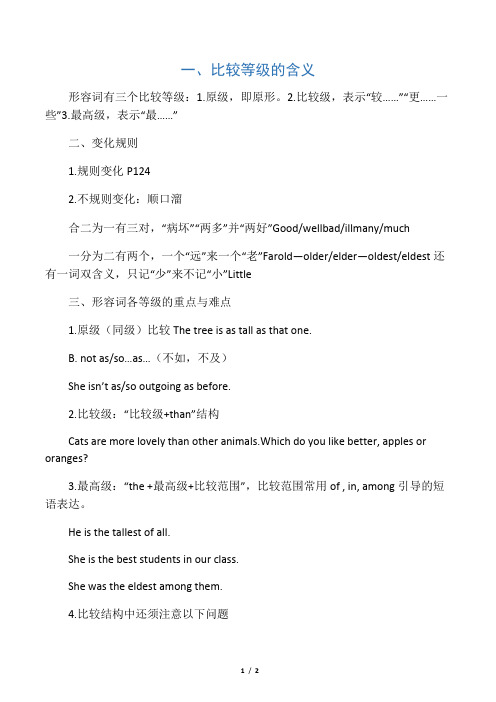
一、比较等级的含义形容词有三个比较等级:1.原级,即原形。
2.比较级,表示“较……”“更……一些”3.最高级,表示“最……”二、变化规则1.规则变化P1242.不规则变化:顺口溜合二为一有三对,“病坏”“两多”并“两好”Good/wellbad/illmany/much一分为二有两个,一个“远”来一个“老”Farold—older/elder—oldest/eldest还有一词双含义,只记“少”来不记“小”Little三、形容词各等级的重点与难点1.原级(同级)比较The tree is as tall as that one.B. not as/so…as…(不如,不及)She isn’t as/so outgoing as before.2.比较级:“比较级+than”结构Cats are more lovely than other animals.Which do you like better, apples or oranges?3.最高级:“the +最高级+比较范围”,比较范围常用of , in, among引导的短语表达。
He is the tallest of all.She is the best students in our class.She was the eldest among them.4.比较结构中还须注意以下问题(1)用比较级表示最高级John is taller than any other boy in the class.John is taller than all the other boys.(2)The+比较级,the+比较级,“越……,越……”Themorebooksyouread,thewideryourknowledge is.(3)“越来越……”:比较级+and+比较级(单音节和少数双音节)More and more +多音节形容词原级Our country is getting stronger andstronger.Ourcountryisgettingmoreandmorebeautiful.(4)表示两者中“较……”时,用the+比较级+of短语He is the taller of the two.(5)形容词的比较级可用much,alittle,alot,even等修饰,使原来的比较级在语意上更Computers are much more useful than TVs.This movie is a little more interesting than thatone.This will make our job even more difficult.(6)当某一事物与其他事物作比较时,被比较事物中不能包括本身。
形容词的比较等级
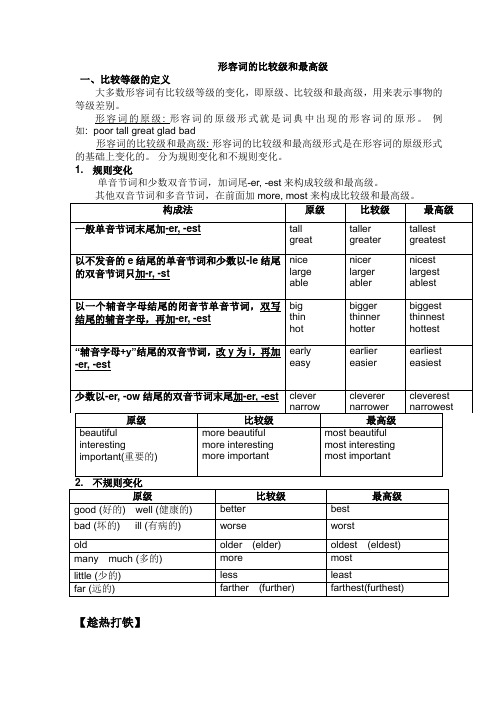
形容词的比较级和最高级一、比较等级的定义大多数形容词有比较级等级的变化,即原级、比较级和最高级,用来表示事物的等级差别。
形容词的原级: 形容词的原级形式就是词典中出现的形容词的原形。
例如: poor tall great glad bad形容词的比较级和最高级: 形容词的比较级和最高级形式是在形容词的原级形式的基础上变化的。
分为规则变化和不规则变化。
1. 规则变化单音节词和少数双音节词,加词尾-er, -est 来构成较级和最高级。
其他双音节词和多音节词,在前面加more, most 来构成比较级和最高级。
原级 比较级 最高级beautiful interesting important(重要的) more beautiful more interesting more important most beautiful most interestingmost important 2. 不规则变化原级比较级最高级good (好的) well (健康的) better best bad (坏的) ill (有病的) worse worstoldolder (elder) oldest (eldest) many much (多的) moremostlittle (少的) lessleastfar (远的)farther (further)farthest(furthest)【趁热打铁】构成法 原级 比较级 最高级 一般单音节词末尾加-er, -esttallgreattaller greater tallest greatest 以不发音的e 结尾的单音节词和少数以-le 结尾的双音节词只加-r, -stnicelarge able nicer larger abler nicest largest ablest 以一个辅音字母结尾的闭音节单音节词,双写结尾的辅音字母,再加-er, -estbigthin hot bigger thinner hotter biggest thinnest hottest “辅音字母+y”结尾的双音节词,改y 为i ,再加-er, -estearlyeasy earlier easierearliest easiest少数以-er, -ow 结尾的双音节词末尾加-er, -est clever narrow cleverer narrower cleverest narrowest一、写出下列形容词的比较级和最高级1. old ______ ________2. busy _________ _________3. thin ________ ________4. many _________ _________5. slow ________ _____6. delicious _________ ______二、用适当形式填空:1. Bob is ________( young ) than Fred.2. He is ______ (bad) at learning maths. He is much _______ (bad) at Chinese and he isthe _________ (bad) at English.3. Annie says Sally is the ________ (kind) person in the world.4 A dictionary is much _________ (expensive) than a story-book.5. An orange ia a little ______ (big) than an apple, but much ________ (small) than awatermelon.6. Playing computer games is______ _____ _____ of all the activities.(interesting).7. The Nile(尼羅河) is ______ ________river in the world. (long)8. Good health is _______ _______ ________thing life. (important)9. Taking a taxi is ______ _______ way to get to the airport. (easy)10. She is_______ than all the other students. (young)11. Where is the ________bus-stop? (near)12. Tom drives much ________ ________than John. (careful)13. The white flower is ________(beautiful). The yellow flower is ______ _______ (beautiful)than the white flower. The red flower is the _____ ______ of the three.二、比较等级的用法一、同级比较结构:as + 形容词原级+ as1、在肯定句中一般用as...as"和……一样"He is as tall as Xiao Hua.2、在否定句或疑问句中可用so… as。
形容词的比较等级(只读保护)

形容词的比较等级一、比较等级—形容词和副词--------------------------------------------------------------------------------------------------------------------------------------------------------------------------------------------------------------------------------二、原级(形容词的原形)1、没有比较含义例I’m happy2、有程度副词修饰very,quite,pretty,too,muchtoo,really+原级3、和…一样A+be+as+adj.+as+B例He is as tall as LiLei.4、A不如B(用原级表示比较的含义)A+be+not+as+adj.+as+B三、比较级例He isn’t as tall as LiLei①、比较级的构成1、直接加er例tall—taller2、末尾字母是e,直接加r例nice—nicer3、辅元辅结尾的,双写末尾字母加er例big—bigger4、以辅音字母加y结尾的,把y变i加er例happy—happier5、多音节词在前面加more 例outgoing—more outgoing6、特殊:Much—more many—more good—better well—better little—lessbad—worse far—farther②、比较级的用法a.than 例the earth is smaller than the sun(small)b. A or B例Who is taller, like LiLei or Tom?(tall)c.Bigger and bigger, more and more越来越d.两个中比较…的那一个。
常见形容词的比较级和最高级有哪些
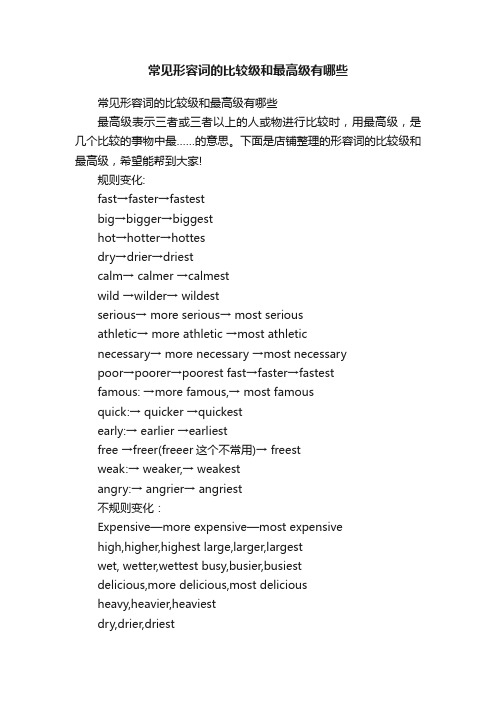
常见形容词的比较级和最高级有哪些常见形容词的比较级和最高级有哪些最高级表示三者或三者以上的人或物进行比较时,用最高级,是几个比较的事物中最……的意思。
下面是店铺整理的形容词的比较级和最高级,希望能帮到大家!规则变化:fast→faster→fastestbig→bigger→biggesthot→hotter→hottesdry→drier→driestcalm→ calmer →calmestwild →wilder→ wildestserious→ more serious→ most seriousathletic→ more athletic →most athleticnecessary→ more necessary →most necessarypoor→poorer→poorest fast→faster→fastestfamous: →more famous,→ most famousquick:→ quicker →qu ickestearly:→ earlier →earliestfree →freer(freeer这个不常用)→ freestweak:→ weaker,→ weakestangry:→ angrier→ angriest不规则变化:Expensive—more expensive—most expensivehigh,higher,highest large,larger,largestwet, wetter,wettest busy,busier,busiestdelicious,more delicious,most deliciousheavy,heavier,heaviestdry,drier,driesteasy easier easiestlazy lazier laziestpretty prettier prettiestnaughty naughtier naughtiestmealy mealier mealiestearly earlier earliestthirsty thirstier thirstiestfar→farther→farthestfar→further→furthestDull—duller--dullestLoud-louder--loudestBoring—more boring—most boringCreative—more creative—most creativeWarm---warmer--warmestgood / well→better→bestbad / ill→worse→worstmany / much→more→mostlittle→less→leastlate→later→ / latestlate→latter→last【拓展】关于形容词和副词的比较级一、含义1. 大多数形容词和副词有三个等级:原级、比较级、最高级: good – better - best2. 比较级:表示两者(人或物)之间的比较。
形容词的比较等级
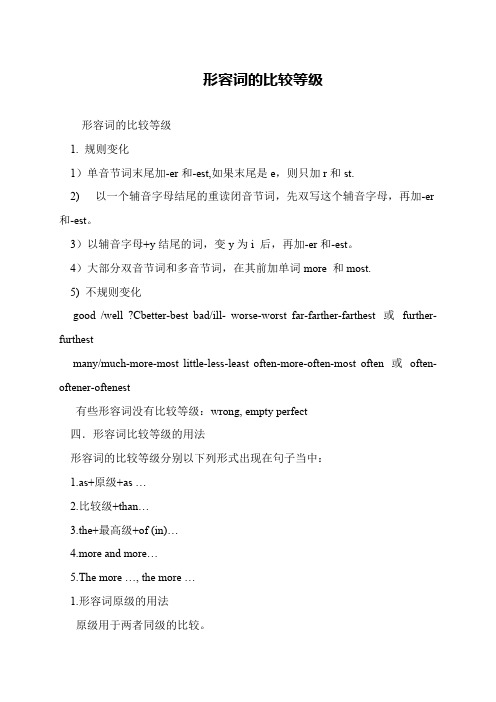
形容词的比较等级
形容词的比较等级
1. 规则变化
1)单音节词末尾加-er和-est,如果末尾是e,则只加r和st.
2) 以一个辅音字母结尾的重读闭音节词,先双写这个辅音字母,再加-er 和-est。
3)以辅音字母+y结尾的词,变y为i 后,再加-er和-est。
4)大部分双音节词和多音节词,在其前加单词more 和most.
5) 不规则变化
good /well ?Cbetter-best bad/ill- worse-worst far-farther-farthest 或further-furthest
many/much-more-most little-less-least often-more-often-most often 或often-oftener-oftenest
有些形容词没有比较等级:wrong, empty perfect
四.形容词比较等级的用法
形容词的比较等级分别以下列形式出现在句子当中:
1.as+原级+as …
2.比较级+than…
3.the+最高级+of (in)…
4.more and more…
5.The more …, the more …
1.形容词原级的用法
原级用于两者同级的比较。
形容词的比较等级构成方式
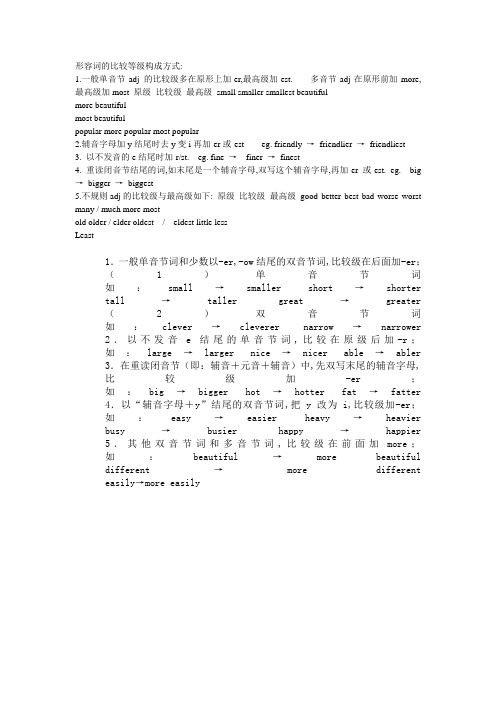
形容词的比较等级构成方式:1.一般单音节adj 的比较级多在原形上加-er,最高级加-est. 多音节adj在原形前加more,最高级加most 原级比较级最高级small smaller smallest beautifulmore beautifulmost beautifulpopular more popular most popular2.辅音字母加y结尾时去y变i再加-er或-est eg. friendly →friendlier →friendliest3. 以不发音的e结尾时加-r/st. eg. fine →finer →finest4. 重读闭音节结尾的词,如末尾是一个辅音字母,双写这个辅音字母,再加-er或-est. eg. big →bigger →biggest5.不规则adj的比较级与最高级如下: 原级比较级最高级good better best bad worse worst many / much more mostold older / elder oldest / eldest little lessLeast1.一般单音节词和少数以-er,-ow结尾的双音节词,比较级在后面加-er;(1)单音节词如:small→smaller short→shorter tall→taller great→greater (2)双音节词如:clever→cleverer narrow→narrower 2.以不发音e结尾的单音节词,比较在原级后加-r;如:large→larger nice→nicer able→abler 3.在重读闭音节(即:辅音+元音+辅音)中,先双写末尾的辅音字母,比较级加-er;如:big→bigger hot→hotter fat→fatter 4.以“辅音字母+y”结尾的双音节词,把y改为i,比较级加-er;如:easy→easier heavy→heavier busy→busier happy→happier 5.其他双音节词和多音节词,比较级在前面加more;如:beautiful→more beautiful different→more different easily→more easily。
- 1、下载文档前请自行甄别文档内容的完整性,平台不提供额外的编辑、内容补充、找答案等附加服务。
- 2、"仅部分预览"的文档,不可在线预览部分如存在完整性等问题,可反馈申请退款(可完整预览的文档不适用该条件!)。
- 3、如文档侵犯您的权益,请联系客服反馈,我们会尽快为您处理(人工客服工作时间:9:00-18:30)。
形容词的比较级和最高级(1)1. 在英语中,在表示“比较…”和“最…”时,形容词要用特别的形式,称为“比较级”和“最高级”,原来的形容词称为“原级”:原级比较级最高级strong强 stronger较强 strongest最强2. 形容词的比较级和最高级的构成方法如下:a. 单音节词和少数双音节词以加-er和-est的方式构成:原级比较级最高级young年轻较年轻最年轻old老较老最老clean干净较干净最干净在加词尾时要注意下面的各种情况:1( ) 1 -Have you got some water to drink?-Here you are. There___ still some in the bottle.A. areB. wereC. isD. was( ) 2 _____ there many American friends in the school last Friday?A. IsB. WasC. AreD. Were( ) 3 There ____ a great many accidents last year.A. wereB. areC. isD. was( ) 4 -How many children ____ in the picture?-Three.A. has thereB. is thereC. have thereD. are there2( ) 1 In 1850, about a third of U. S. A___ covered by forests.A. wereB. has beenC. /D. was( ) 2 Most of our earth____ covered by water.A. areB. isC. wasD. were( ) 3 Sunday ____ the first day of the week.A. isB. areC. amD. be( ) 4 Neither___right.A. answers areB. answers aren'tC. answer isD. answer isn't3( ) 1 The population of the world ____ still ____ now.A. has; grownB. will; growC. is; growingD. is grown( ) 2 There ____ many people running in the park every morning.A. isB. wereC. areD. have( ) 3 These police often___the children across the street.A. helpB. helpsC. helpingD. is helping4( ) 1 ___ going to England by air next week.A. The Green family areB. The Greens family areC. The Green's family areD. Green family are( ) 2 The whole family ____ enjoying the beautiful music now.A. is allB. all isC. all areD. are all( ) 3 Our class ___ big.A. isB. areC. wereD. will5( ) 1 Neither he nor I ____ from Canada. We are from Australia.A. isB. areC. amD. be( ) 2 Either you or he ____ right.A. areB. isC. doesD. were( ) 3 Neither Mary nor her brother____ good at singing.A. isB. areC. is notD. are not( ) 4 Not only Tom but also Alice and Mary ____ busy.A. isB. wasC. areD. has6( ) 1 Physics ___ interesting to us.A. areB. hasC. isD. were( ) 2 The news____ exciting. We got excited at it.A. isB. wasC. wereD. are( ) 3 Though mathematics____ hard, we all work at it hard.A. areB. wereC. wasD. is二.把下列句子变成含有宾语从句的复合句。
1. The tickets are in my pocket. The man said.The man said___________________2. I have joined the League. He said.He said________________________3. The earth goes round the sun. Our teacher told us.Our teacher told us________________________________________ 4. Have you heard of anything about Mei? The man asked us.The man asked us_____________________________________5. Can you swim? Please tell me.Please tell me_________________6. How can we do the work well?I always think of ___________________________________________7. When do you go to bed? He asked me.He asked me _________________8. Where did you meet Mr Green?I wanted to know___________________________________________9. What are they drawing? Do you know?I wanted to know_____________________________________10. Where do they stop on the way? I asked._____________________________________________________ 11. What will you speak at the meeting? Could you tell me?_____________________________________________________ 12. Do they like to make friends with us? He asked._____________________________________________________ 13. “ I am doing my homework.” He said._____________________________________________________ 14. “I will come back.” Tom said._____________________________________________________ 15. “Is he doing his homework?” Jim asked._____________________________________________________16. “When will he come back?” Tom asked._____________________________________________________17. “How can I get to the station?” Could you tell me?_____________________________________________________18. “Why is the train late?”Would you tell me?_____________________________________________________19. “Where is Tom?”They asked._____________________________________________________三.用所给词的适当形式填空1.The radio says it _________ cloudy tomorrow. (be)2.The headmaster hopes everything ______ well. (go)3.Tom says that they ________ (play) basketball at six o’clock yesterday evening.4. I hear they __________ (return) it already.5. He said that they _________ members of the Party since 1948. (be)6. He asked what they __________ at eight last night. (do)7. The teacher told his class that light _______ faster than sound. (travel)8. I think you __________ about the newest movie now. (talk)9.I didn’t know whom the letters _________ from. (be)10. I didn’t know what time he _______ the letter. (write)11. Miss Wang told me that the earth ______(move) round the earth.12. Could you tell me who _________ away the book already? (take)13. Ling Feng told me he _________ to several times. (be)14. Our teacher told us in class the sun _______ in the east. (rise)15. Can you tell me what they ______ yesterday? (do)。
